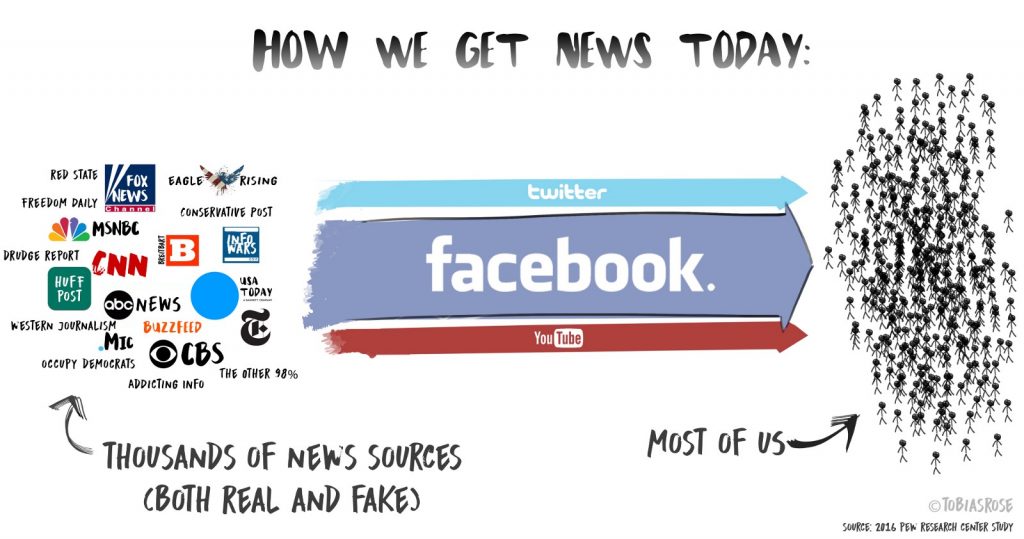There is both money and political advantage to be gained from internet misinformation so think carefully before you retweet/post/link to anything – is this real, where is the evidence, what are the counter arguments?
Fake news (1)
People all over the world are getting rich by fabricating stories (2). The method is simple: fabricate a sensational story, preferably involving someone famous, and post it on a web site. The story attracts visitors to the site intrigued by the sensational headline and for ever site visitor, advertisers pay you a small fee. The more visitors the site gets, the higher up the search engine rankings it goes, so the number of visitors increases and the associated advertising revenue increases. One 18 year old in Macedonia made $60,000 in 6 months. These sites look very professional, and carry advertising from major international corporations such as Amazon and so appear very credible sources of information. So how do you know they are fake?

Paid advocacy
There are also groups and individuals being paid to deliberately mislead the public in order to advance the interests of a particular individual, group, or industry. For example, Nigel Lawson’s Global Warming Policy Foundation, funded by anonymous donors and linked to coal-fired power companies in Europe, uses similar tactics to the tobacco lobby to sow misinformation about climate change (3).
Politicians
And then there are politicians. Political advantage can be gained by being ‘economical with the truth’ (4), spreading deliberate misinformation or only partial information, carefully selected to support one particular view point. The selective (mis)use of statistics, particularly percentages, is a particularly common method adopted by politicians to support their own position. Similarly the use of carefully selected time periods to demonstrate an apparent trend that, when a broader perspective is taken simply does not exist.

Truth or fabrication? Our filter bubble
There is no doubt that it is increasingly difficult to tell truth from fiction and this is a profound threat to our democracy – if we don’t know the facts how can we make appropriate judgements. We must, therefore, work harder at discerning the truth and must be much more careful about sharing, liking, up-voting on social media than we are at present. We should also be aware of the filter bubble that surrounds our social media interactions. Web site algorithms are now very effective at identifying our likes, dislikes, political opinions and view points. Driven by advertising where revenues directly correlate with clicks, search engines and social media increasingly show us content that *they* judge is what we want to see, filtering out material that has differeing views and opinions. This can leave us having our existing views reinforced without ever seeing alternative perspectives.

The good news
The good news is that the internet, the enabler of many of these problems, also provides some great tools to help us navigate the fake news oceans. It is up to us, indeed it is our duty, to make use of these tools to challenge those who would deliberately mislead us, and to be aware of the biases inherent in many sources. For example, if you read The Daily Mail you should be aware that it has a strong conservative bias through story selection and political affiliation, and has a poor track record with fact checkers. They may publish misleading reports and omit reporting of information that may damage conservative causes (5).

What to do
So, before you despair at the state of the world, here’s how you can fight back.
- Always check the veracity of something before you share it. It’s very easy to click the ‘like’ button or repost something in a rush. Don’t! Please always check first – how do you know this is true?
- It’s great to share something with like-minded people (assuming they don’t already know) but it’s much more powerful to share information to help those who have only seen a distorted or erroneous view of a subject. Show them the facts.
- Don’t let misinformation go unchallenged. Use the fact checking resources below to find the data/facts you need to counter ill-informed opinions. Stick to the facts and avoid emotive language, it will only antagonise.
- Seek out web sites that peddle fake news and misinformation and use the same resources to challenge entrenched opinion. You may just prick someone’s information bubble because they are not used to seeing alternative view points.
- If you always use the same sources to get your news firstly check them for media bias and then find an alternative source with the opposite bias and compare the two before coming to a conclusion.
- Always base your arguments on facts and evidence from credible sources, not emotion. The scientific method of having your peers challenge your work has proved robust and effective for over 200 years, so try to use sources that have been peer reviewed before publication.
- Be very wary of articles that do not identify sources, and of sites and organizations that are not transparent about their fuding.
- Think Tanks are often quoted in the media and some are given enormous coverage. Many of these are small organizations that are little more than lobbying organizations for special interest groups, companies or industries. Reputable think tanks are transparent about their funding so you can use sites like Transparify to check the funding of a think tank before you take too much notice of it.

Breitbart Extreme Right Bias
Don’t expect to see anything change quickly – this is going to take time. With everything going on in the world from Trump to global warming, Brexit, terrorist atrocities, the rise of the far right, all fed by fake news, there has rarely been such a dark time. But, we can change things for the better if we consistently and jointly challenge lies and half truths whenever we see them. Hopefully you will find some of these resources useful in that fight.
Global resources
- Snopes http://www.snopes.com
The oldest and largest fact-checking site on the Internet. - ThatsNonsense http://www.thatsnonsense.com
One of the leading websites on the Internet that deals with debunking Internet hoaxes, hearsay, rumours and fake news. UK based. - Media Bias/FactCheck https://mediabiasfactcheck.com/
An independent online media outlet dedicated to educating the public on media bias and deceptive news practices. - SumofUs https://www.sumofus.org/
A global community dedicated to fighting for people over profits. - Sleeping Giants https://www.facebook.com/slpnggiants
Dedicated to stopping racist, sexist, anti-Semitic and homophobic news sites by stopping their advertising dollars. - Debunkatron http://debunkatron.com/
Dedicated to debunking myths, pseudoscience, grand conspiracies, quackery, and the supernatural. - SkepticalScience https://www.skepticalscience.com
Explains what peer reviewed science has to say about global warming and counters the most used climate myths. - Change.org https://www.change.org/
Connecting people across geographic and cultural borders to support causes they care about. - Wikipedia https://en.wikipedia.org
One of the world’s largest reference websites. - Transparify http://www.transparify.org/
The first-ever global rating of the financial transparency of major think tanks.
UK specific resources
- FullFact https://fullfact.org/
The UK’s independent factchecking charity. - TheyWorkforYou https://www.theyworkforyou.com
Takes open data from the UK Parliament, and presents it in a way that’s easy to follow. Check the voting history of every MP. - 38degrees https://home.38degrees.org.uk/
Campaigning organisation focused on UK issues.
Brexit resources
- Scientists for EU http://scientistsforeu.uk
A campaign by UK scientists to keep the UK in the EU - European Movement http://www.europeanmovement.co.uk
The European Movement is an independent, cross-party organisation committed to keeping the UK in the EU - The European Union https://europa.eu/european-union/index_en
Official website of the European Union - The BBC http://www.bbc.co.uk/news/uk-politics-32810887
Brexit: All you need to know about the UK leaving the EU
References
(1) https://en.wikipedia.org/wiki/Fake_news_website
(2) https://www.wired.com/2017/02/veles-macedonia-fake-news/
(3) https://www.campaigncc.org/climate_change/sceptics/hall_of_shame
(4) https://en.wikipedia.org/wiki/Economical_with_the_truth
(5) https://mediabiasfactcheck.com/daily-mail/

